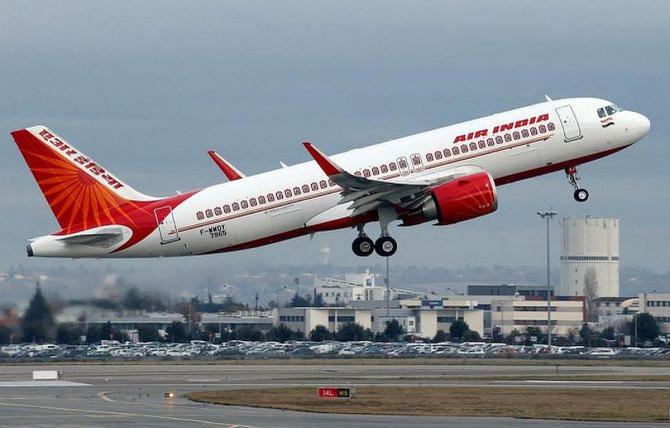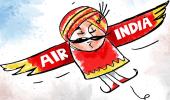That such a deal can be greeted with celebration in the camps of both buyer and seller speaks volumes about the airline and its recent history, explains T N Ninan.

Something had to be radically wrong with Air India for the entire country to welcome its privatisation.
This is a country in which Arun Shourie is still answering questions about the terms on which, two decades ago, he privatised companies far less important than Air India.
In noticeable contrast, there has been little or no criticism from any colour of the political spectrum about the sale of a once iconic airline, except perhaps for some unconvincing noises from the Reds and some pro forma expressions of worry by sections of the employees -- pro forma because they must in fact be hugely relieved that their salary cheques will keep coming.
What was wrong was that the airline had been losing money for an unbroken stretch of some 15 years.
There could well be other government companies with a similar track record, but none with the scale of losses that would qualify them as the wrong kind of trillionaire -- Air India's accumulated losses being more than four-fifths of the way to a trillion rupees, and counting at Rs 20 crore a day.
So it was obvious to even die-hard Leftists that the airline had come to the end of the runway without any hope of taking off.
A crash into corporate hell was imminent -- with associated difficulties such as empty airport slots, 100 poorly maintained aircraft to be got rid of before they rotted in an aviation slump, and staff to be given terminal benefits.
In short, mayhem and massive embarrassment.
The relief in the government once Tata stepped forward to play white knight found a reflection in the prime minister granting an audience to the Tata Group chairman on the day of the airline's hand-over.
This, even as officials in the finance ministry worked out how to finance liquidation of the left-behind debt, totalling Rs 61,000 crore (Rs 610 billion).
The non-aviation assets left with the government are worth Rs 14,000 crore (Rs 140 billion), and the cash value of the sale is all of Rs 2,700 crore/Rs 27 billion (the rest of the airline's Rs 18,000 crore/Rs 18- billion price tag being debt that Tata has agreed to take on).
The de facto write-off of the remaining Rs 44,000 crore (Rs 440 billion) has been presented as win-win -- which it well may be, given the alternative!
That such a deal can be greeted with celebration in the camps of both buyer and seller speaks volumes about the airline and its recent history.
So while the government's broad smiles after Tata Group entered the picture are understandable, someone should get a comment out of the man who is quiet as a mouse after having set the airline on its crash course -- Praful Patel, civil aviation minister in the first Manmohan Singh government.
It was Mr Patel who pushed through the merger of Air India and Indian Airlines, with disastrous consequences because the anticipated synergies were not realised.
He has also, in the receding past, had to face questions for ordering a massive number of aircraft, thereby landing the airline with debt that has weighed heavy on its books ever since.
Then there were tales told of prime slots on key routes being vacated even as a private airline moved in.
Vijay Mallya, eager at one stage to operate his own now-defunct airline on international routes, publicly accused the minister of acting for another airline, provoking an angry response from Mr Patel that Mr Mallya's Kingfisher did not qualify.
Air India will now be added to Tata Group's list of loss-making entities.
For, despite the sharp improvement in group operations and purposefulness under N Chandrasekaran's leadership, Tata minus its cash cow (Tata Consultancy Services, or TCS) has been in the red for three years running.
That may change this year, with Tata Steel using surging steel prices to report higher profits than even TCS.
Besides, even if Air India stays in the red for some time, the scale of losses should reduce quickly.
The interest burden should come down, the cost of the remaining debt should get reduced, and synergies with the group's existing airlines should be used to improve seat occupancy.
As a bonus, Tata may also find that it no longer gets attacked publicly by ministers.
Feature Presentation: Aslam Hunani/Rediff.com












 © 2025
© 2025